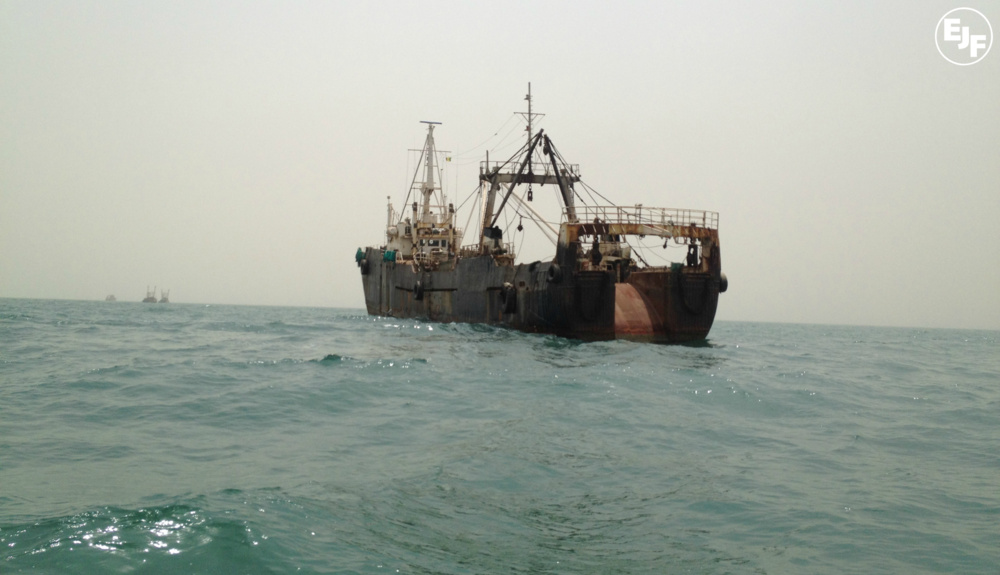
Illegal fishing clamp-down in Sierra Leone
Freetown, Sierra Leone, 24/01/12
On the evening of 18 January, a Sierra Leone Government Fisheries officer and members of the Republic of Sierra Leone Armed Forces Maritime Wing arrested the Marampa 803 following a three-month surveillance investigation by the Ministry of Fisheries and Marine Resources (MFMR) and EJF.
Since October 2011, three foreign-owned bottom trawlers have been documented fishing illegally in the Inshore Exclusion Zone (IEZ) and pursued by MFMR. Fines of over US $100,000 have already been collected by the Government of Sierra Leone, and more are expected to be levied in the coming weeks. Active investigations continue into the actions of a further three vessels.
Taken together, this represents an unprecedented crackdown on illegal fishing by the Government, demonstrating the commitment of the Minister of Fisheries and Marine Resources, Dr Soccoh Kabia, to end pirate fishing in Sierra Leone.
“Over the past few months, we have witnessed significant progress in fisheries enforcement in Sierra Leone. A new EJF vessel has been able to produce a large amount of evidence since the end of October 2011, and this has been acted on by our partners in the Government. If this pressure is maintained on international trawlers operating illegally in Sierra Leone, we are confident that the profit can be taken out of pirate fishing."
"It is important that Sierra Leone’s regional and global partners build on this success. By creating far greater transparency in all aspects of the global industrial fishing fleet it will be possible for management authorities, retailers and consumers to understand where their seafood came from, allowing them to avoid illegally caught fish.” Steve Trent, EJF's Executive Director
Earlier in the year, EJF provided evidence that led European authorities to seize £4 million worth of fish in the Spanish port of Las Palmas de Gran Canaria. This catch has subsequently been released by Spanish authorities, allegedly in breach of European law.
EJF has been investigating, documenting and exposing Illegal, Unreported, and Unregulated (IUU) – "pirate" – fishing since 2004 with a current focus on the negative environmental, social and economic impacts in West Africa, particularly Sierra Leone and Liberia. In Sierra Leone, EJF operates a community surveillance patrol vessel to document evidence of illegal trawler activity within the IEZ reserved for artisanal fishers. IUU fishing is the term given to any fishing activity that contravenes national or international laws, such as using banned fishing gears, targeting protected species, operating in protected or reserved areas or at times when fishing is prohibited, not reporting or misreporting catches, or operating without any sort of permit or license to fish.
IUU fishing is a global concern and recent studies estimate that illicit catches are worth between US $10-23bn annually. IUU fishing undermines sustainable fisheries management, devastates marine environments and jeopardizes the livelihood and food security of some of the world’s poorest people. Illegal, foreign-owned, industrial pirate fishing vessels often target developing countries that have little capacity to address the problem. Countries across sub-Saharan Africa are estimated to lose nearly US $1bn a year from IUU fishing.
It is estimated that Sierra Leone loses US $29m a year due to pirate fishing. IUU activities severely impact on Sierra Leone’s coastal communities, who are dependent on fish for an estimated 80% of the animal protein they consume. Over 80% of global fish stocks are over-exploited, fully-exploited or depleted, according to the United Nations Food and Agriculture Organisation's most recent assessments. Scientists have estimated that, at current levels of exploitation, most commercial fish stocks could have collapsed by the year 2048.
SIGN UP FOR OUR EMAILS AND STAY UP TO DATE WITH EJF